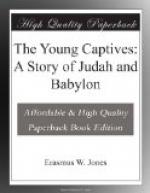“Perhaps,” said the daughter, “if he hears of the death of his companions, he will never return, but flee over the mountains to his own country.”
“A trivial mistake, my daughter,” said the patriot; “his country would lie in an opposite direction.”
“But could he not change his course?” asked the half-offended daughter.
“Yea, verily, my child, if he should find that he was in the wrong path; peradventure, this would constitute his first business.”
“I can hardly hope for such a happy result, sister,” said Shagoth. “The conniving demagogue will cling to his office until compelled by a stringent law to abandon it.”
“Before many days, the Rab Mag will return,” said the erect promenader. “And will not the king ere long set apart another day for the public worship of the gods? And if this foreign pretender escapes now, justice will overtake him then. The vengeance of our deities will not always slumber, and these worshipers of other gods shall soon know that the best offices in our government and the best interests of our beloved country are not to be entrusted to a horde of superstitious foreigners. O my country! Sons! let me caution you again to be on the watch for these three rulers. They hold important offices, and such a favorable opportunity is not to be lightly regarded. O my country, my country!”
. . . . . . .
The day appointed for the dedication of the great image at last arrived. Its ushering in was hailed by the populace with universal enthusiasm, marked by shouts of rejoicing. The day was fair and beautiful. No threatening cloud was visible in the heavens. The metropolis, at a very early stage, presented one grand scene of activity and preparation. The soldiery were out by thousands, their glittering panoply dazzling in the clear sunbeams. Officers of all grades hurried to and fro with excitement visible on their countenances. Those swarming thousands were evidently expecting some signal, at which they were ready to march. The word of command was at last given, and the multitude moved forward.
Onward the mighty concourse moved through the principal thoroughfares, amid the ringing of bells, the blasts of trumpets, and the waving of banners, until they arrived in a spacious square in front of the royal palace. Here they halted.
At last, the massive portals were thrown open, and the king, in a magnificent chariot, surrounded by an imposing guard, made his appearance. He waved his hand in the direction of the multitude, when, with one voice, the people exclaimed:
“O king, live forever!”
The procession was soon on its way to the plains of Dura, the king leading the pompous train, while eager thousands brought up the rear. On the way, they were joined by thousands more, who at different places waited their arrival, and at every stage the high praises of the King of Babylon echoed from ten thousand voices.




